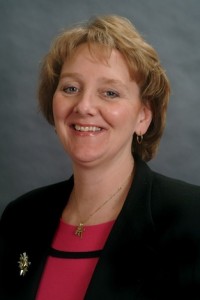
Nancy Bittner
Mobility is now firmly part of the nursing curriculum at the Regis College School of Nursing, Science and Health Professions in Weston, Mass.
"As soon as they start their nursing programs, we have them in the lab," Assistant Dean Nancy Bittner says. Associate's, bachelor's and graduate students are required to purchase and carry iPhones, which they learn from day one how to use in simulated clinical environment as well as in the classroom. "A week later, they're in the hospital," Bittner says, assigned to about two dozen hospitals in the Boston area, as well as to home-care agencies and some of the school's own clinics.
The school switched to iPhone in 2009 from Palm PDAs, which it began using in 2006. The devices are loaded with clinical and administrative reference manuals, textbooks and other educational materials, a plan that grew out of a need for convenience. Even after reference tools started going online more than a decade ago, Bittner says a lot of students still carried printed reference manuals because they couldn't always access the electronic texts on desktop computers when in clinical settings.
"It was really a very functional idea," Bittner says. "Going to a handheld helped them with their direct access and gave them the most up-to-date information."
The National League for Nursing in 2008 named Regis one of six National Centers of Excellence for Nursing Education, recognizing the nursing school for its efforts to prepare students for the transition to the workforce. The mobile technology was "one of our key exemplars," Bittner says.
Last academic year, the school started testing various Skyscape applications for its nursing students, including nTrack, a nursing procedure log to monitor how well they are picking up clinical skills. Bittner says this is starting to help faculty determine whether their students are entering vitals into patient records and asking the right questions to assess patient history and conditions. "We really to this day have no way of tracking them except on paper," Bittner reports.
In their senior year of the bachelor's and graduate programs—for those seeking to become nurse practitioners and other advanced-practice nurses—students have preceptorships, where they practice without faculty present. That means they need reference tools at the ready since they don't have a seasoned professional to answer their clinical questions. "We're looking to develop that a little more," Bittner says.
"We're in talks to have an electronic medical record donated," the associated dean adds. Stay tuned.














